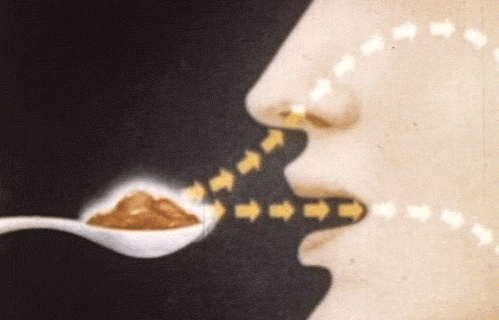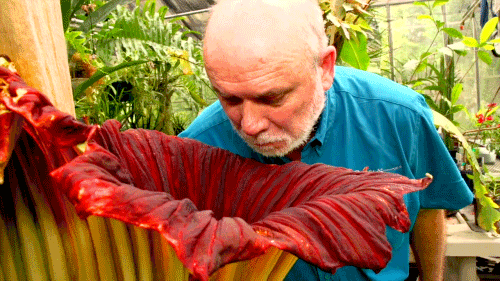There’s a reason why tequila makes you sick, vegetables are gross, and lemons taste like candy.
Steven D. Munger, Ph.D., the associate director of the Center for Smell and Taste at the University of Florida, went on Reddit to answer some fascinating questions about how we taste and smell things. Here’s what we learned from his AMA:
Tongue maps are bullshit.
Dorling Kindersley / Getty Images / Via ThinkStock
“The tongue map was a mistake from the get-go…a mistranslation from the early 20th century (from a German manuscript, I believe). It persists to this day, even in college textbooks,” said Munger.
This is how smell and taste works:

gifbay / Via giphy.com
“When you eat something, your tongue detects chemicals in the food that elicit one or more of those five basic tastes (sweet, salty, bitter, sour, and umami)… Umami is the savory taste of glutamate… Odors from the food pass through the back of your mouth to your nose,” said Munger. Your brain basically processes all these different signals to give you the perception of flavor.
Some people have a distorted sense of smell.

Cube Vision Productions / Via giphy.com
The disorder is called parosmia. Basically, people with this condition “smell something, but it’s different then what it should be.”
There’s even such a thing as phantom smells.

Paramount Pictures / Via giphy.com
People with phantosmia hallucinate smells. It’s sometimes associated with epilepsy, said Munger.
And some people have no sense of smell at all.

FoodbeastTV / Via youtube.com
People who have no sense of smell whatsoever are called anosmics. They’ll use temperature, texture or irritants (like carbonation or spices) to sense some sort of flavor. Although it will just be a diminished flavor, according to Munger.
We’re not really sure why most people have anosmia. It could be an injury at birth, genetic, or something that happened during an accident or disease (head trauma or inhaling toxic chemicals), he added.
If you want to see how important smell is to flavor, you can do a taste test yourself:

MTV / Via giphy.com
Basically, all you have to do is hold your nose while you eat a random jelly bean. You’re not suppose to know the flavor, otherwise that will ruin the experiment. Though Munger recommends citrus. You’ll be able to tell whether the taste is sweet or sour, but you won’t be able to discern the fruit.
When you open your nose while you’re still chewing, you’ll know what the flavor is. This is similar to how people with colds or allergies experience taste.
Most smells are not universally liked or disliked. We all have different preferences.

Ripleys / Via media.giphy.com
It depends on how you grew up. If you grew up on a farm, for example, then you probably wouldn’t think manure smells bad. But if you’re not used to it then you might think it smells gross.
Smell is associated with memory.

CBS / Via media.giphy.com
The smell of fresh-baked cookies might be comforting, but it’s not the smell itself that will make you calm or relaxed. It’s the positive memory associated with the smell of grandma’s cookies, for example, that will give you a good feeling.
The very smell of something — like tequila — can make you sick.

AMC / Via giphy.com
A perfect example is tequila, said Munger. If you ever threw up from tequila shots, then the smell of tequila can make you sick in the future. A severe form of this is called a conditioned taste aversion.
“Flavor-tripping” is a real thing and it will make lemons taste like candy.

First Look / Via media.giphy.com
Miracle berries are tasteless on their own, but after you eat them a lemon will taste sweet. There’s an active protein in the “miracle berries” called miraculin. In acidic pH (think lemons), the miraculin “changes shape and activates the sweet taste receptor.”
Wine-tasters who talk about “mineral” or “earthy aromas” are not entirely full of bullshit, maybe…

HBO / Via media.giphy.com
“Many professionals don’t have an enhanced ability to smell (though it probably also isn’t damaged). But they do excel with memory… I think odors can be quite varied, but putting a label on them is hard,” said Munger. However, he says wine-tasters are not necessarily wrong.
“Lead acetate is sweet. And the phenomenon of “mineral” taste is likely real (perhaps is chemesthesis),” he said.
There’s a reason why we have to “learn to like coffee.”

NBC / Via media.giphy.com
“Bitter compounds are typically aversive, which can be a good thing as many are toxic (think strychnine or cyanide),” he said.
Sugar seems to be a universally preferred taste.

Columbia Pictures / Via media.giphy.com
“Although some like higher concentrations than do others,” he said.
There’s even a scientific reason why some people don’t like certain vegetables.

Metro-Goldwyn-Mayer / Via giphy.com
There’s a bitter receptor sensitive to sulfur compounds (like those found in broccoli and other similar veggies). Some people have an insensitive version of this receptor so they’re indifferent to those compounds.
Some people have an extraordinary amount of taste buds.

DreamWorks / Via media.giphy.com
These people are “super-tasters” and the condition is called hypergeusia.
If you want to know more about smell and taste, check out the Reddit thread or The University of Florida Center for Smell and Taste.

















